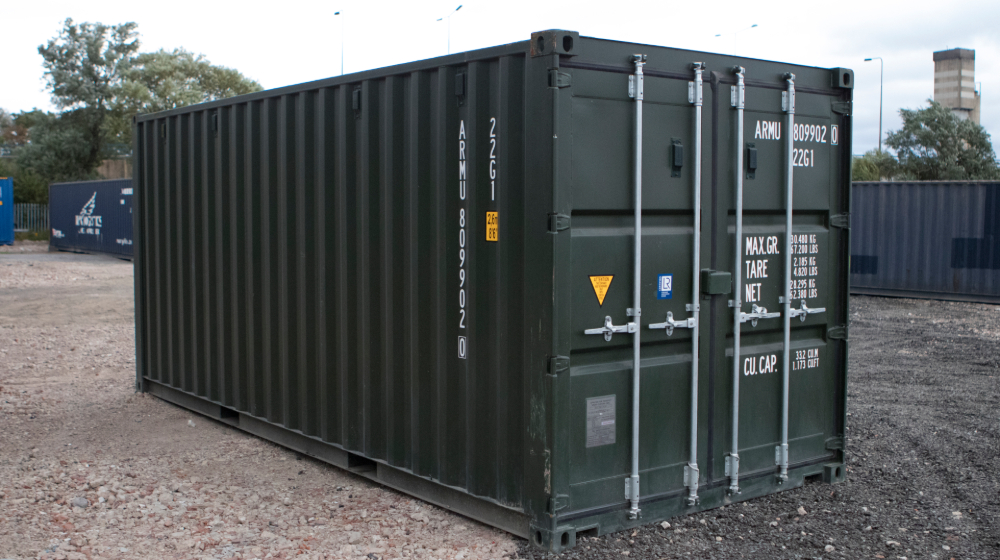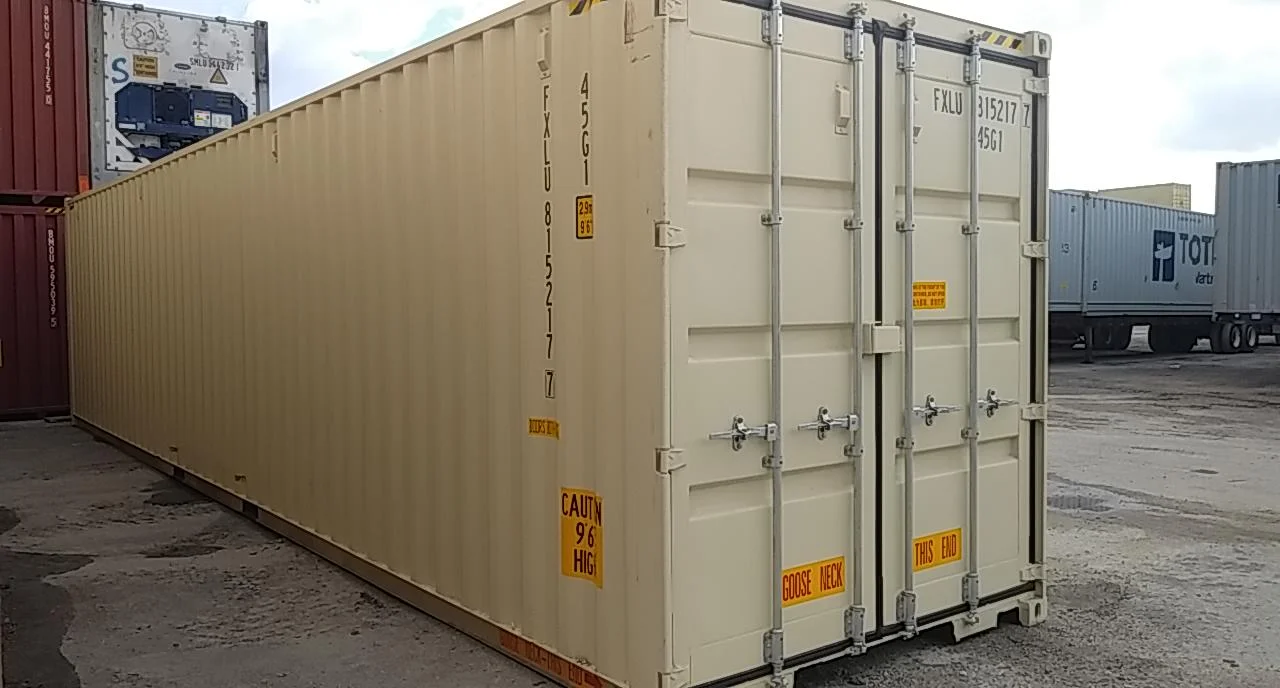10 Reasons to Buy New Shipping Container 40 x 8 x 9.6 for Modern Urban Living
10 Reasons to Buy New Shipping Container 40 x 8 x 9.6 for Modern Urban Living
Blog Article
The Ultimate Guide to Picking the Right Shipping Container for Your Requirements
When it comes to choosing the right delivery container, understanding your details requirements is essential. You'll intend to consider factors like size, kind, and product to guarantee you make the most effective selection. From common dimensions to specialized alternatives, there's a lot to check out. And also, budgeting for both the container and any adjustments can make a big distinction. Allow's damage down the vital aspects to assist you locate the perfect fit for your demands.
Recognizing Delivery Container Sizes
When you're picking a shipping container, understanding the different dimensions readily available is essential for making the right choice. Shipping containers normally can be found in standard lengths of 20 and 40 feet, however you'll likewise locate various other dimensions. Knowing the size you need depends on what you plan to shop or transport.If you're relocating smaller products, a 20-foot container may be excellent, while larger shipments typically need a 40-foot container. The elevation can additionally differ; high dice containers provide additional upright space, which can be useful for taller goods.Before making a decision, determine your cargo, and take into consideration just how much room you'll need for filling and dumping. Always element in potential future demands-- selecting a slightly bigger container might save you headache down the line. Inevitably, selecting the ideal size will enhance performance and assure your products are safe and secure throughout transportation
Types of Delivery Containers Available
There are a number of kinds of delivery containers offered, each developed for specific objectives and cargo demands. The standard completely dry container is versatile, perfect for general freight. If you're shipping subject to spoiling goods, think about a cooled container, which maintains a regulated temperature level. For extra-large products, high dice containers supply additional elevation, suiting taller loads.If you require to deliver hefty equipment or devices, level rack containers offer a sturdy base without walls. At the same time, open-top containers enable simple loading of tall freight, with a detachable tarp covering for defense. If you're searching for flexibility, consider a collapsible container that can be easily kept when not in use.Lastly, specialized containers like container containers are used for fluids, while vented containers are developed for bulk freight that needs air flow. Recognizing your freight kind will help you select the ideal container to fulfill your shipping requires successfully.
Material Considerations for Durability
When choosing a shipping container, the material plays an essential role in its resilience. You'll wish to evaluate the advantages of steel versus light weight aluminum, specifically pertaining to corrosion resistance. Comprehending these variables can help you make a more informed option for your delivery needs.
Steel vs. Aluminum Containers
Exactly how do you select in between steel and aluminum containers for your shipping requires? Begin by taking into consideration longevity. Steel containers are robust and deal exceptional stamina, making them suitable for hefty loads and rough problems. They withstand damage from impacts and are commonly cheaper, which can be a significant aspect for budget-conscious buyers.On the other hand, aluminum containers are light-weight, which can save you on shipping prices. They're easier to maneuver and are a wonderful choice if you require to deliver products frequently. Aluminum is generally much more expensive and much less robust than steel. Weigh your specific demands meticulously, consisting of weight, price, and the kind of freight you'll be delivery, to make the right option for your circumstance.
Rust Resistance Aspects
Choosing the appropriate material doesn't simply include weight and cost; rust resistance plays a significant duty in sturdiness. When selecting a shipping container, take into consideration the atmosphere it'll encounter. Steel containers, while strong, can corrosion if not correctly treated. Seek choices with protective coverings or galvanization to enhance their lifespan. Aluminum, on the various other hand, offers all-natural corrosion resistance, making it suitable for coastal areas or moist conditions. Nevertheless, it can be much more expensive. Additionally, evaluate the container's use-- if it'll be exposed to chemicals or rough weather condition, focus on materials that can stand up to these problems. Buying a corrosion-resistant container currently can conserve you from pricey repair work or replacements down the line. Select intelligently for long-term benefits.
Modifications and Modification Options
Shipping containers aren't simply for moving items; they can site here be changed to fulfill your particular requirements via numerous adjustments and personalization options. You can convert a basic container into a comfy office, a momentary retail shop, and even an individual health club. The opportunities are nearly endless.Think about including windows, insulation, or ventilation to boost convenience. You may also consider electric wiring, plumbing, or also look at here now custom-made shelving to improve functionality. If safety and security's an issue, reinforced locks can supply tranquility of mind.For visual appeal, you can repaint the container or include a distinct style to make it attract attention. Don't forget concerning flooring choices-- whether you want long lasting plywood or something more innovative, it can raise the space.Ultimately, tailoring your shipping container to fit your requirements can boost use and develop an unique atmosphere that reflects your style.
Assessing Your Transportation Demands
When it concerns using your modified delivery container, comprehending your transport needs is crucial. Start by identifying what you'll be delivery-- whether it's heavy equipment, retail products, or individual items. Each sort of freight has various needs concerning dimension, weight, and accessibility.Next, consider the distance and mode of transportation. Are you delivering in your area, nationally, or globally? This influences the container's design and performance. If you're utilizing vehicles, assure your container fits standard measurements for simple loading and unloading.Additionally, consider transportation problems. Will your things require special protection from weather condition or temperature level fluctuations? If so, you may need insulation or ventilation functions in your container.Lastly, analyze how frequently you'll be delivering goods. Regular deliveries might call for an extra durable and flexible container to meet continuous demands. By resolving these factors, you'll be well-prepared to choose the best delivery container for your requirements.
Budgeting for Your Delivery Container
Setting an allocate your shipping container is crucial for guaranteeing a smooth purchasing process. Figure out just how much you can manage to invest. Prices can differ significantly based on dimension, condition, and kind. New containers normally cost more, yet used ones can use considerable savings.Next, consider any kind of additional costs you could incur, such as transport charges, distribution costs, and adjustments. If you prepare to customize the container, consider those expenses too. Research different vendors to compare rates and find the finest deal that meets your needs.Don' t fail to remember to include any kind of licenses or guidelines that may apply to your acquisition and usage of the container. By plainly detailing your budget, you'll be better prepared to make informed decisions, ensuring you get the ideal container without damaging the financial institution.
Upkeep and Treatment for Durability
To guarantee your shipping container lasts for several years, regular maintenance is essential. Beginning by checking the exterior visit this site for corrosion, damages, and damages. If you detect any type of problems, address them right away to stop additional degeneration. Tidy the container occasionally, both within and out, to remove dust, particles, and moisture that can lead to corrosion.Ensure the doors secure properly and oil the joints to prevent rust and sticking. If you're using the container for storage, consider adding ventilation to lower moisture and mold and mildew growth. For added security, apply a rust-inhibiting paint or sealer annually.If your container's located in a rough environment, like seaside areas, you could require to increase maintenance frequency. Keep an eye on the floor covering, also; any kind of indications of wear must be repaired right now. With these easy actions, you'll prolong the life of your shipping container significantly.
Frequently Asked Questions
Just how Do I Find a Reputable Delivery Container Provider?
To locate a reputable shipping container vendor, begin by looking into on-line reviews, asking for recommendations from friends or market calls, and contrasting prices. Always inspect their qualifications and guarantee they offer high quality containers that satisfy your demands.

Can I Rent a Delivery Container As Opposed To Purchasing?
Yes, you can certainly lease a shipping container as opposed to buying one. Lots of distributors use rental options, which can save you cash and provide adaptability if you just need it for a short period.
What Permits Are Needed for Container Placement?

Are Delivery Containers Weatherproof and Ideal for Outdoor Storage?
Yes, shipping containers are generally weatherproof, designed to stand up to extreme conditions. Their robust building and construction keeps your products protected and dry, making them suitable for outside storage space. Simply ensure correct ventilation to stop dampness accumulation inside.
Just how Do I Move a Shipping Container When Acquired?

Report this page